Test Drive Unlimited Solar Crown’s technical issues, both online and in performance terms, do a disservice to a novel, detailed game world.
It seems odd, perhaps even unfair, to begin a review of a game grumbling about its technically wobbly launch. After all, the server issues that Test Drive Unlimited Solar Crown has suffered with in its ‘Gold Edition’ early access period are hopefully floating in the context of the lifespan of the game, and nobody complains about the fact that Michelangelo took it a little longer than expected to get the Sistine Chapel right, right?
The problem is that not mentioning it in the bit of the review you read before getting distracted by something on the sidebar would underplay just how spectacularly badly it’s all gone. Even with only the relatively modest population of Gold Edition purchasers, the servers crumbled faster than a dunked Digestive. Often, you’d be held at the login screen, unable to start the game at all. If you were lucky enough to hit the tarmac on Hong Kong island, you might still be unable to start a race, even against AI-controlled opposition, because of a mandatory check in with the servers before every event. Worse still, you might actually finish a race and still lose that progress as the game pings the server again before the results screen. I found myself having to play the game exclusively between the hours of six and nine in the morning to ensure a reliable connection, squinting at apexes through bleary, tired eyes. And, just to reiterate, this all occurred before the floods of new players arrived on the game’s official launch day.
The other reason it bears mentioning early on in this review is that, even though the always-online service has become slightly more stable, it feels instinctively unnecessary. The game is perfectly capable of populating its races with AI cars rather than its preference of seamlessly adding other real world players, so why make the check for those players mandatory? What’s more, unlike many games, including genre stable-mate The Crew, Test Drive Unlimited isn’t hell bent on getting you to spend real money to top up your in-game balance, so it’s not like there’s a delicate real-to- pretend economy to doggedly police via a constant online connection. The lack of microtransactions should be something to be celebrated, but we’ve inherited a good chunk of the inconvenience that usually accompanies them. In fact the most damning thing is the existence of the original Test Drive Unlimited, which managed to handle the blend of online and online play far more elegantly nearly two decades ago in 2006.
So assuming – and it is a big assumption – that the game is functional at all, what’s actually there? Well firstly, a roughly one-to-one recreation of Hong Kong Island to serve as your occasionally-online, modestly-multiplayer automotive playground. Initially, Hong Kong might seem like a strange pick, given that it’s best known for its dense urban areas, but there’s a wealth of serpentine mountain routes and off-road trails towards the center of the island. It’s perhaps this that gives developer KT Racing the confidence to leave in some of the narrower city streets, rather than widening them to accommodate higher speeds and less careful driving. Some of the best races Solar Crown serves up involve moments such as dashing through the narrow Macau ferry terminal or down a cluttered side alley. Hong Kong Island turns out to be an inspired choice of location, and its authentic scale is refreshing after so many games that only offer an abridged representation of a real place.
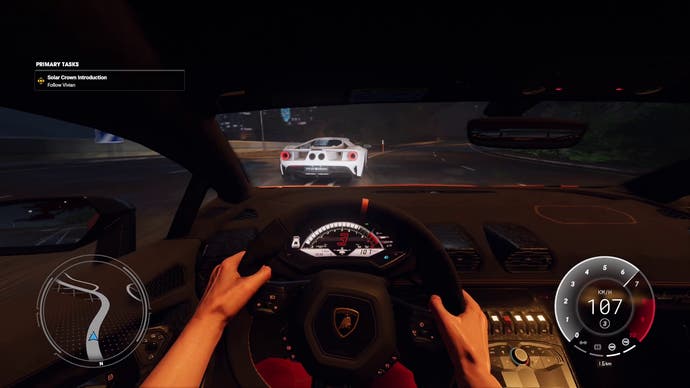
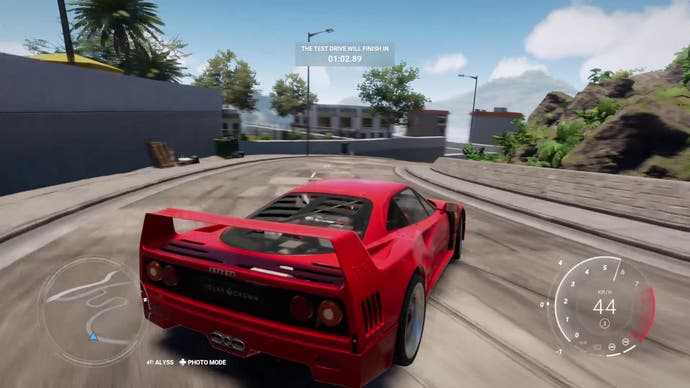
Unfortunately, while the map has a pleasing attention to detail, the game engine simply can’t keep pace. This is either a game that is extremely poorly optimized or an engine that fundamentally isn’t equipped to deliver what’s being asked of it. The console versions in particular suffer, offering a choice between a performance mode that offers higher frame rates but only at a resolution of 1080p, or a ‘graphics’ mode which increases the resolution and fidelity slightly but only at a frame rate that can’t consistently hit 30 frames per second. Don’t get me wrong, it’s not exactly Sophie’s Choice we’re discussing here, but both options feel inherently compromised and, dare I say it, distinctly last-gen. It’s a shame because the characterful map is done a disservice, and the game does have rare moments of beauty, but they are usually related to the lighting and atmospheric effects. I was particularly struck by the representation of the morning haze out in the bay, which I strongly associate with that part of the world.
Characterful isn’t a word I’d use to describe the actual characters in the game, mind you. Solar Crown’s plot is some by-the-numbers nonsense about elite street racing, delivered by a host of forgettable, dead-eyed marionettes. It’s endemic of a general sense that the game has had a personality bypass, something that’s evident in the events and activities you’ll be participating in as you build a reputation with one of the two clans in the game. There’s the odd memorable combination of car and track, such as an early duel against a single opponent in a Mini Cooper through a freight harbour, but there’s nothing of the scale and ambition of the showcase in Forza Horizon, or even The Crew Motorfest’s themed playlists.
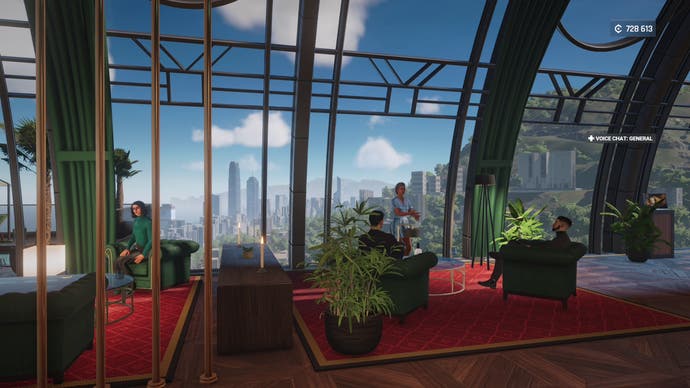
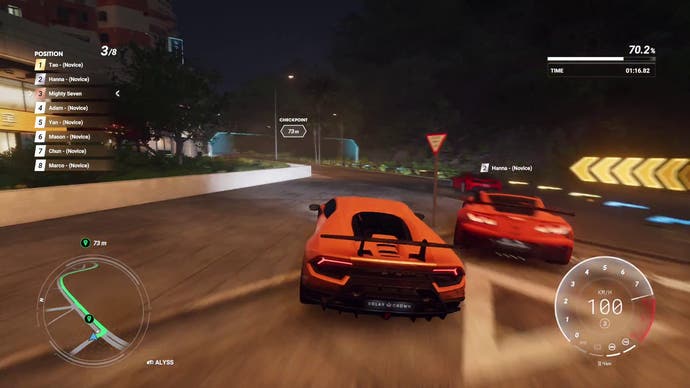
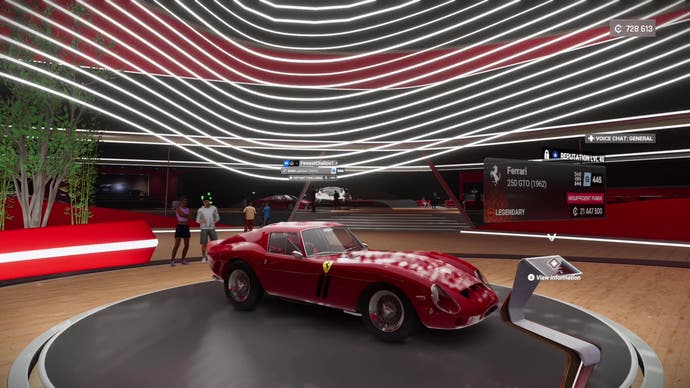
Progress through the campaign can feel slow as well; The most desirable cars are eye-wateringly expensive and require a certain reputation level to unlock, so you’ll spend more time in individual vehicles than in a game like Horizon that dishes out exotic supercars like brightly colored candy. To a degree I respect the decision, which aims to have you build a genuine sense of connection to and ownership over your fleet of cars, something that the original TDU did so well. It also feels, though, like a bit of a smokescreen to cover the fact that the overall car list in Solar Crown is more modest than its bigger budget open-world competitors.
At least the meat and potatoes of racing is fairly entertaining. The game has a curious handling model, generating huge amounts of understeer when you’re braking for corners, but dishing out armfuls of oversteer when you lift off in medium and high speed turns. It feels unnatural and while you will inevitably adapt to these quirks, it’s odd that a studio that produced a series of realistic World Rally Championship games has settled on something that feels so little like driving a real car.
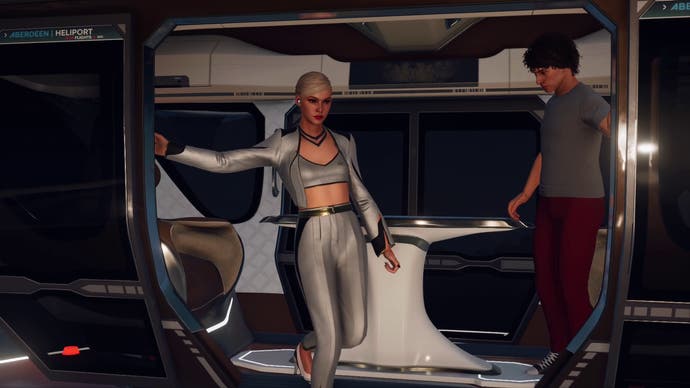
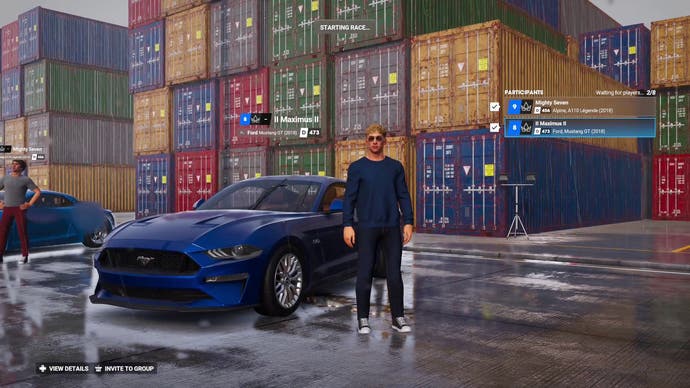
Almost uniquely, Test Drive Unlimited Solar Crown’s fate is likely to be determined not by the races and events, the handling or the extremely slight storyline, but by how players embrace Hong Kong Island as a place to hang out with friends in virtual cars. It’s hard to overstate how differently the original Test Drive Unlimited played from any other racing game when it arrived in 2006. It was essentially a social driving game, with players often spending more time cruising the map in groups than participating in formalized events.
Nowadays, though, players have plenty of alternative options to scratch the same itch, most notably Forza Horizon and The Crew Motorfest, the latter of which is built by a studio that rose from the ashes of original Test Drive Unlimited developer Eden Studios. With daunting competition like that, Test Drive Unlimited Solar Crown’s only hope is that it can keep its technical niggles at bay and that its novel, lovingly crafted recreation of Hong Kong Island is enough to claw its way to cult favorite status among genre fans and digital tourists.
A copy of Test Drive Unlimited Solar Crown was provided for review by Nacon.
#Test #Drive #Unlimited #Solar #Crown #review #tech #issues #mar #return #original #openworld #racers